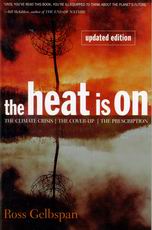
| Home News Releases | Contact |
Sources Bookshelf

The Heat Is On
The Climate Crisis, The Cover-up, The Prescription
Gelbspan, Ross
Publisher: Perseus Books, Reading, MA, USADate Written: 01/07/1997
Year Published: 1997
Pages: 278pp Price: $19.00 ISBN: 0-7382-0025-5
Please see our media profile in Sources:
Sources Select Resources
At least three meanings can be taken from the title of this book. First that global climate change is underway, documented, and threatens catastrophe. It's not in the future, not a theory, and not "just another environmental problem."
Second, the pressure - whether they and we know it - is on societies, governments, industries, organizations and each of us to dramatically reduce emissions of CO2 and other greenhouse gases. No organization or individual is powerless in this.
Third, the media's feet are to the fire in this, as spelled out especially in "The Battle for the Control of Reality," the second chapter of this eight-chapter book.
Author Ross Gelbspan is a Pulitzer Prize-winning 31-year veteran of daily journalism. He has covered environmental affairs on and off for the past 25 years. His December 1995 cover story on climate change for Harper's was nominated for a National Magazine Award.
Many people - developing their notions of reality unduly from mainstream media - think scientists are divided about whether global climate change is upon us, whether it's man-made or natural, and the effects.
And indeed, scientists are divided. They are, that is, if you consider "divided" as meaning, on the one side, virtually all the world's 2,500 climate scientists, all the relevant scientific organizations and all the relevant scientific journals, and on the other side a dozen "greenhouse skeptics" hand-picked and heavily funded by the fossil fuel industry.
With daily revenues of $2-billion, this industry has virtually unlimited funds to invest in protecting its planet-killing turf. Their dirty dozen "greenhouse skeptics" are their mouthpieces on Capitol Hill, in various forums and in the media. Their lines are: [a] Global warming doesn't exist. [b] But if it exists, it isn't man-made (that is, due to burning fossil fuels). [c] And if it does exist and is man-made, it's good for us.
In the battle for reality some traditional weapons of mainstream journalism cause self-inflicted wounds. The pursuit of "both sides of the story," combined with a predilection for "he said, she said" adversarial reportage, make media sitting ducks to advance the fossil fuel agenda.
"The tiny group of dissenting scientists," Gelbspan writes, "(has) been given prominent public visibility and congressional influence out of all proportion to their standing in the scientific community# They have used this platform to pound widely amplified drumbeats of doubt about climate change. These doubts are repeated in virtually every climate-related story in every newspaper and every TV and radio news outlet#"
Their documented strategy is to "reposition" the debate as to whether there's a problem. The industry has generally succeeded in making this the false focus. This focus could not be maintained were it not for the media's lack of proper homework. "These dozen or so dissidents - contradicting the consensus view held by 2,500 of the world's top climate scientists - have#prevented discussion about how to address the problem," Gelbspan writes.
"The facts of global warming are being denied with a disinformation campaign as ferocious as any in history. A major battle is underway: In order to survive economically, the biggest enterprise in human history - the worldwide oil and coal industry - is at war with the ability of the planet to sustain civilization. The trillion-dollar-a-year coal and oil industry is pitted against the oceans, forests, ice caps and mountains of the earth as we know them today." That industry would rather profit from the last drop of oil being burned than join in the massive transformation required if we are to save the earth.
It wouldn't take much for journalists to start reporting this story the way it deserves to be reported, says Gelbspan in a personal interview. "Take a scientist to lunch, look at the evidence of extreme climate events. If a paper ran a couple of stories a week, it would help enable the shift in public opinion needed to turn the situation around."
The fate of the earth has not yet become a fit subject for page one except in rare cases. During the first and second world wars, war news was page one news every day. In this war - the war on our planet by us - the fate of the earth is dealt with in a fragmented, inside-page and occasional way. That is not the way to win a war. But "our" lifestyle - that is, the lifestyle of North American journalists - includes fossil fuel-powered internal combustion engine vehicles. Our jobs include rolling out "Wheels" sections every week. We're a poor choice as motivated soldiers, too much conflict of perceived interest. It's amazing how many of us are joining the battle, each in her or his way.
[Review by Barrie Zwicker]
Subject Headings
- Antarctic Research
- Antarctica
- Carbon Dioxide Emissions
- Climate & Carbon Dioxide
- Climate Change
- Climate Change & Adaptation
- Climate Change Denial
- Climate Change Policy
- Coastal Communities
- Disinformation
- Drought
- Floods/Flooding
- Forest Fires
- Forest Fires & Weather
- Glaciology/Glaciers
- Global Climate Change
- Greenhouse Gas Emissions
- Greenhouse Gases
- Hurricanes
- Ice
- Media Bias
- Media Propaganda
- Oil & Gas Industry
- Oil Industry
- Storms
© Sources 2026. The information provided is copyright and may not be reproduced in any form or by any means (whether electronic, mechanical or photographic), or stored in an electronic retrieval system, without written permission of the publisher.